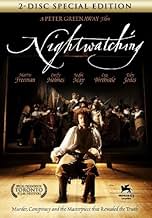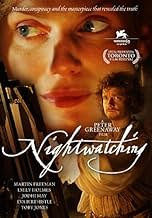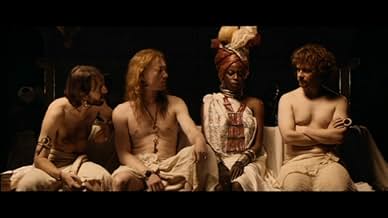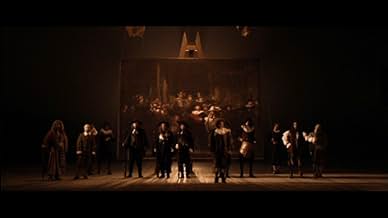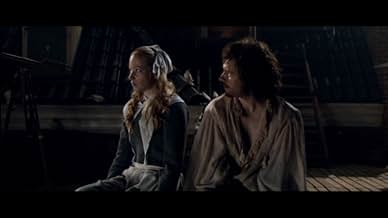Ajouter une intrigue dans votre langueAn extravagant, exotic and moving look at Rembrandt's romantic and professional life, and the controversy he created by the identification of a murderer in the painting 'The Night Watch'.An extravagant, exotic and moving look at Rembrandt's romantic and professional life, and the controversy he created by the identification of a murderer in the painting 'The Night Watch'.An extravagant, exotic and moving look at Rembrandt's romantic and professional life, and the controversy he created by the identification of a murderer in the painting 'The Night Watch'.
- Réalisation
- Scénario
- Casting principal
- Récompenses
- 6 victoires et 6 nominations au total
- Catharina
- (as Anna Antonowicz)
Avis à la une
Highly original, deliberately false, playing loose with fact, frankly sexual, and dry and cold. And not very interesting.
It's fair to say very few people will like this movie, even among those inclined to watch it in the first place, even among fans of the director Peter Greenaway. Luckily, there will be those few who will find it so stylized, startling, offbeat, and intense as to love it. It does suggest something brilliant in the pretty murk it also is. And the actors are performing their hearts out, every one of them pushing their emotional limits within the crisp, dry set designs, which are stiff, symmetrical, and stagey. And beautiful.
There is no question this is an "art" film, highly controlled and aesthetic head to toe. The photography has a kind of studio controlled fluidity, not the moving camera of a steadicam or classic Hollywood, but a steady, slow tracking horizontally inward or sliding sideways. This helps keep the scenes alive, a little, but it also adds to the drone of the whole, since the movement is nearly always the same. In a way, the camera is in synch with the sets, which are also similar in scale and proportion throughout, and symmetrical.
What's it about? Rembrandt and his two wives and one known lover (all compressed into one invented time frame). That's not bad material for a movie, but there is also the political intrigue that Greenaway inserts, a confusing and dull affair with vain attempts to mimic (I think) the drama of the Da Vinci code (the book, not the movie). "Nightwatching" has almost a second plot which comes out of a fantastical reinterpretation of the most monumental of Rembrandt's paintings, "Nightwatch." Greenaway as both writer and director became convinced (or at least wanted to create that impression) that a conspiracy was built into the symbolism of the painting, even a murder. (A second disc in the deluxe DVD edition has a documentary exploring this.) It might have worked, but it's just poorly constructed and the writing is willfully obtuse. amidst the larger sexual and social threads of the main plot, this other idea is an intrusion.
What is missing almost completely in this 2 ¼ hour is any sense of Rembrandt the painter. His personality, his personal life, his apparent rebelliousness are all evident, but the artist, and the art, is missing. The one thing this obsession leads to is some crisp photography of the one painting, and though the shots go by too fast, it's revealing to see up close Rembrandt's rough style, which was more and more at odds with the Dutch tendency for detail (a direction Vermeer typifies a couple decades later).
For people familiar with contemporary theater, this is it on film. It looks great and has passion. But it's just not very interesting. The writing is strained, and the ideas thin. Most of all, it's indulgent. A lot of talent squandered.
There are references to the earlier films, most obviously - to the 'Contract', the latest are so strong that sometimes one may think it is a deep 'remake' of that earliest Greenways' work.
While the presentation is generally easier-going then in some previous films, it does not mean loss of depth and loads of small details (for which the film deserves a HD version - something to appear, probably, in the year 2107?). Like all Greenway films, this one to be watched many times to discover new and new layers.
The historic plot is doubtful however neither naive nor unrealistic. And most likely it is just a canvas to put the ideas on: which present in numbers.
The film badly needs editing. Everything that happens when a camera is turned on is not necessarily art or even interesting. The 144 minutes I saw would have benefited had they been shrunk by nearly an hour. First kill all of the improvised scenes. Then kill all of the gratuitous sex scenes and needless expletives. Then kill all of the scenes in which an actor talks directly to the audience. Then kill all of the precious, mannered references to other Greenaway films -- statues played by semi-nude actors, sides of beef hung out to dry, etc. etc. Tighten up the detective story. Lighten up the art analysis. Minimize the posing scenes. Voila. You'd be at 90 minutes without any problem.
Not for the uncommitted or the faint of heart.
Some viewers have pointed out how moving the film is - and indeed it is. But I for one have found ALL of Greenaway's films to be deeply moving. Unlike mainstream directors, he doesn't attempt to tug at the heartstrings, but instead deploys one rich, elegaic, achingly beautiful set piece after another, letting the ideas and associations reach the emotions of the audience. In Greenaway's world, extreme beauty and extreme horror exist cheek-by-jowl - his heroes (more so than his heroines) look for logic and order, and find ultimately chaos and decay - the good go unrewarded, the bad go unpunished - and yet, out of it all, rises a triumphant celebration of life, art, human aspiration, and the possibilities of cinema itself.
If you want a bedtime story about goodies overcoming baddies, look elsewhere. 'Nightwatching', like Greenaway's other work, offers - and demands - much more than that.
Le saviez-vous
- AnecdotesDirector Peter Greenaway has said of this film: "The 'painter film' is a small genre of its own: Michelangelo, Rembrandt himself (at least twice), Modigliani, Caravaggio, etc, and none more so than just lately. Picasso, Van Gogh (repeatedly), Bacon, Vermeer, and now Goya have received the treatment. I suppose our major aim in the film Nightwatching, apart from trying to match the Master's mastery of light, is to demonstrate Rembrandt as social moralist: it contains a murder mystery - the unraveling of which is the heart of the film. And also to regard Rembrandt as an inventor of cinema before the Lumière brothers...We tried to rise to the challenge in the film, remaking, with high definition digital tape, that upper right-hand corner space of Velázquez's Las Meninas - the area between the walls and ceiling has been described as the greatest bit of painting ever - a painting which is just and only and magnificently a painting of a block of darkly contrasting air. We, too, attempting a grand response Rembrandt image of light, tried to film a block of air that insubstantially floats, irrespective of walls and ceiling. Godard said that the cinema was the truth 24 frames a second. Can painting go better and say that paintings are the truth for all time? What's a second in cinema time if you can have an eternity in painting time? Cinema has come and gone in 112 years. What, then, is the age of painting?".
- GaffesAt 1:36:42 Rembrandt says that Geertje doesn't wash herself. Just 1 minute later he says he saw her undressing to wash.
- Citations
Titia Uylenburgh: Women in the 17th century are allowed to smoke, write, correspond with Descartes, wear spectacles, insult the Pope, and breast-feed babies.
- ConnexionsFeatured in Rembrandt's J'Accuse...! (2008)
Meilleurs choix
- How long is Nightwatching?Alimenté par Alexa
Détails
Box-office
- Budget
- 7 500 000 $US (estimé)
- Montant brut mondial
- 698 544 $US
- Durée2 heures 14 minutes
- Couleur
- Mixage
- Rapport de forme
- 2.35 : 1
Contribuer à cette page



